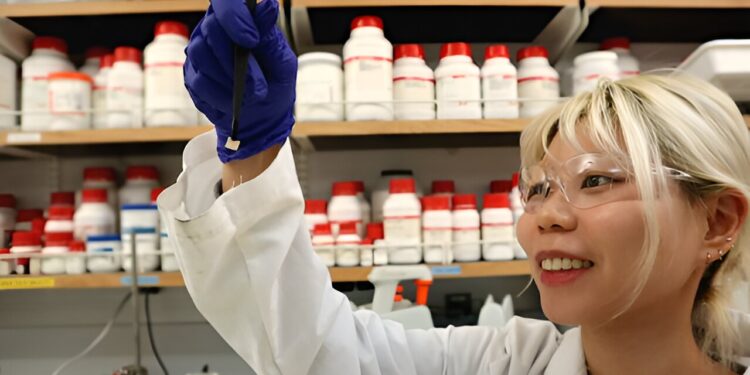Juya Jeon uses tweezers to hold engineered hydrogel in Fuzhong Zhang’s lab. Credit: Juya Jeon
Traditional medical adhesives used in surgical applications often have limited bioabsorbability, high toxicity, and lack of customization, leading to suboptimal surgical outcomes. Recent advances in synthetic biology offer a promising alternative: tailor-made biocompatible and biodegradable adhesives designed for specific internal biomedical applications, such as tissue repair and surgical glues.
Researchers working with Fuzhong Zhang, professor of energy, environmental and chemical engineering at the McKelvey School of Engineering at Washington University in St. Louis, are addressing this challenge with a new class of hydrogels built entirely from proteins.
Zhang’s collaborators include Marcus Foston, associate professor of energy, environmental and chemical engineering; Guy Genin, Harold and Kathleen Faught Professor of Mechanical Engineering; and Mohamed A. Zayed, associate professor of surgery and radiology. Their programmable design allows precise control of mechanical and adhesive properties, thus meeting the limitations of synthetic bio-glues. The research was published in ACS Applied Materials and Interfaces.
“This work is one of the first to prove that synthetic biology can be used not only to produce materials, but also to understand the sequence-structure-function relationships of materials,” said Juya Jeon, a graduate student in the laboratory of Zhang and first author of the study. .
“Our hydrogels are made of artificially engineered proteins that have never been created before. These unique proteins give our hydrogels a combination of advantageous properties, including exceptional underwater mechanical and adhesive properties while being bio-absorbable and highly adaptable. to tissue repair/engineering applications.”
The team’s new material builds on previous studies from Zhang’s lab on underwater adhesives inspired by aquatic mussels and their sticky mussel foot proteins (Mfp). Jeon improved on previous work by carefully combining silk-amyloid peptides and Mfp into a silk-amyloid-mussel foot protein (SAM) hydrogel.
Acting as a sort of molecular chef, Jeon adjusted the proportions of the two main ingredients to obtain SAM hydrogels that can be finely tuned to display unique combinations of biocompatibility, bio-absorbability, strength, extensibility and adhesion underwater to biological surfaces.
Jeon also explored the complex relationships between protein sequence and hydrogel properties, which will be crucial for designing SAM hydrogels with features suitable for personalized medical repair applications. By fabricating SAM hydrogels using various combinations of silk-amyloid and Mfps, Jeon and Zhang successfully revealed complex relationships between the structure and properties of the materials.
They found that an increase in silk-amyloid repeats significantly improved cohesive strength and toughness, while extending Mfp length increased surface adhesion but decreased overall strength. One particularly interesting variant demonstrated exceptional strength, resistance to deformation, and underwater adhesiveness when tested in a preclinical model.
“The sequence-structure-property relationships discovered in this study provide invaluable information to guide the future design of protein adhesives with tunable properties, paving the way for personalized adhesives tailored to specific applications,” Zhang said.
“This study marks a significant step forward in the search for safer and more effective surgical adhesives, opening the doors to a new era of personalized bioglues for various medical needs. It also illustrates how synthetic biology can be used to illuminate complex molecular relationships and manufacture advanced biomaterials.
More information:
Juya Jeon et al, Genetically engineered protein-based bioadhesives with programmable material properties, ACS Applied Materials and Interfaces (2023). DOI: 10.1021/acsami.3c12919
Provided by Washington University in St. Louis
Quote: Engineering of customizable bio-adhesives for personalized medical repair (December 6, 2023) retrieved on December 6, 2023 from
This document is subject to copyright. Apart from fair use for private study or research purposes, no part may be reproduced without written permission. The content is provided for information only.



